Have you ever wondered what game wardens do on a daily basis to protect wildlife and enforce hunting and fishing laws? Game wardens play a crucial role in preserving our natural resources and ensuring the safety of our wildlife. Understanding their daily tasks and responsibilities is essential in appreciating the importance of their work.
Key Takeaways:
- Game wardens work on federal and state lands, enforcing hunting, fishing, and trapping laws.
- They have a wide range of working conditions, including outdoor work and irregular hours.
- Game wardens patrol their assigned areas and enforce wildlife regulations.
- They also have administrative, educational, and legal duties, such as issuing licenses and conducting educational programs.
- Some game wardens specialize in criminal investigations and search and rescue missions.
- The primary duties of game wardens involve enforcing fishing, hunting, and wildlife protection laws.
By understanding the day-to-day tasks and responsibilities of game wardens, we can appreciate their significant contribution to conserving wildlife and enforcing the law. Let’s explore in more detail what game wardens do and how they fulfill their important role.
Where Does a Game Warden Work?
Game wardens can work in various locations, including federal wildlife areas and state lands, where they carry out important duties to protect wildlife and enforce hunting, fishing, and trapping laws. The specific agency they work for may vary depending on the state or region they are located in. Some game wardens serve as Federal Wildlife Officers and Special Agents for the U.S. Fish and Wildlife Service, where they police federally protected lands and investigate crimes related to poaching and natural resource theft. However, the majority of game wardens work as conservation officers on state land, employed by a state “Department of Wildlife,” “Department of Natural Resources,” “Department of Fish and Game,” or a similar agency.
Regardless of the location or agency, game wardens are sworn police officers who patrol large areas of protected wilderness areas, parks, waterways, and wetlands. Their primary focus is to protect and preserve wildlife and natural resources, ensure public safety, enforce hunting and fishing laws, and promote public interest in the outdoors.
Working Conditions and Settings
Game wardens have a busy and rewarding daily life, which involves working primarily outdoors, interacting with the public, and enforcing hunting, fishing, and harvesting laws. They are dedicated to protecting and preserving wildlife and natural resources, ensuring public safety, and promoting public interest in the outdoors.
A career in wildlife conservation means spending the majority of the workday outside, immersed in nature. Game wardens may be patrolling their assigned areas on foot, horseback, All-Terrain Vehicles (ATVs), boats, snowmobiles, or even in planes. They need to be prepared for various working conditions, including extreme weather, such as scorching heat or freezing rain.
Game wardens often work irregular hours, including nights, weekends, and holidays. They need to be available when the public is most likely to be engaged in hunting and fishing activities. These irregular work hours are necessary due to the nature of the job, which involves extensive travel, surveillance at odd hours, and responding to emergencies such as search and rescue missions.
During their patrols, game wardens interact with the public, educate communities on wildlife laws, issue hunting and recreational licenses, and enforce regulations. They may also visit schools and other groups to deliver educational presentations and participate in community outreach programs to promote environmental conservation.
Additionally, game wardens may be required to testify in court for cases related to wildlife law violations. Their knowledge and expertise in wildlife conservation and law enforcement are crucial in ensuring justice is served.
Working closely with wildlife biologists, park rangers, and ecologists is part of a game warden’s routine. They collaborate to collect data on wildlife and natural habitats, contributing to the preservation and management of ecosystems.
Working Conditions and Settings
Game wardens have a busy and rewarding daily life, which involves working primarily outdoors, interacting with the public, and enforcing hunting, fishing, and harvesting laws. They are dedicated to protecting and preserving wildlife and natural resources, ensuring public safety, and promoting public interest in the outdoors.
A career in wildlife conservation means spending the majority of the workday outside, immersed in nature. Game wardens may be patrolling their assigned areas on foot, horseback, All-Terrain Vehicles (ATVs), boats, snowmobiles, or even in planes. They need to be prepared for various working conditions, including extreme weather, such as scorching heat or freezing rain.
Game wardens often work irregular hours, including nights, weekends, and holidays. They need to be available when the public is most likely to be engaged in hunting and fishing activities. These irregular work hours are necessary due to the nature of the job, which involves extensive travel, surveillance at odd hours, and responding to emergencies such as search and rescue missions.
During their patrols, game wardens interact with the public, educate communities on wildlife laws, issue hunting and recreational licenses, and enforce regulations. They may also visit schools and other groups to deliver educational presentations and participate in community outreach programs to promote environmental conservation.
Additionally, game wardens may be required to testify in court for cases related to wildlife law violations. Their knowledge and expertise in wildlife conservation and law enforcement are crucial in ensuring justice is served.
Working closely with wildlife biologists, park rangers, and ecologists is part of a game warden’s routine. They collaborate to collect data on wildlife and natural habitats, contributing to the preservation and management of ecosystems.
Working Hours
Game wardens often work non-standard hours, including nights, weekends, and holidays, to ensure the enforcement of wildlife laws and the protection of natural resources. While a standard 9:00 am to 5:00 pm shift is possible for some game wardens, most officers do not have the luxury of working typical hours or a standard work week. Atypical hours are often required due to the nature of the job, which involves extensive travel, patrolling large areas, and responding to emergencies.
Game wardens may find themselves patrolling at night, on weekends, and on holidays when people are engaging in recreational activities such as hunting and fishing. Additionally, game wardens need to consider the behavioral patterns of wildlife, which dictate when they can observe wildlife for the purpose of tracking population levels and health.
For example, the South Carolina Department of Natural Resources recognizes that game warden careers “can be very disruptive to family life.” The department notes that “It is necessary that the officer’s family understand and support the idea that the job must come first.
Work Hours Image
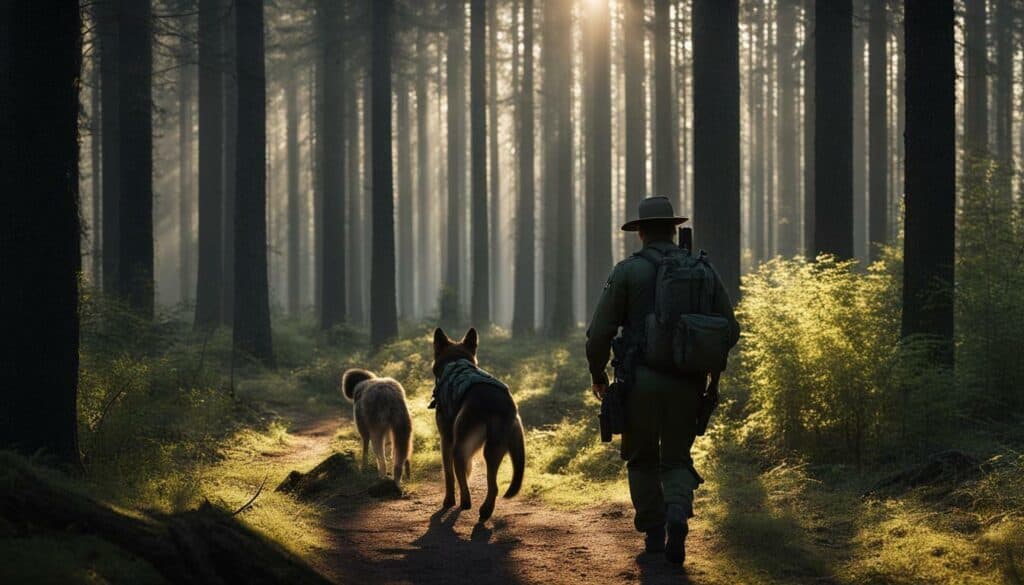
Daily Patrol Duties
As game wardens, our primary duty is to patrol our assigned areas and ensure that wildlife regulations are enforced and natural resources are protected. This means that a majority of our day (or night) is spent outdoors, patrolling on foot, horseback, ATV, boat, snowmobile, or even in a plane, depending on the terrain and the location we are assigned to.
We may work alone or in teams, depending on various factors such as the geographic location, expected job duties, terrain difficulty, and the number of department staff members. For example, in Oregon, game wardens patrol solo, with one trooper per patrol unit. However, patrols that carry certain risks, such as boat, ATV, snowmobile, and horse patrols in wilderness areas, are normally done by two troopers for safety reasons.
Our patrol areas can vary greatly in size, ranging from an entire county encompassing thousands of acres of land or coastline to a smaller territory within a state. Regardless of the size, we are responsible for knowing every square mile of our assigned area, including things like illegal road hunting areas, problem wildlife spots, and the overall condition of the ecosystem.
The daily duties of a game warden revolve around patrolling their assigned area, ensuring the enforcement of wildlife regulations, and protecting natural resources.
A game warden’s primary duty is to patrol their assigned area and make sure that wildlife regulations are enforced and natural resources are protected. This means that a majority of a game warden’s day (or night) will be spent outdoors, either on foot, horseback, on an ATV, in a boat, on a snowmobile, or even in a plane, patrolling an area.
Game wardens may work alone or in teams, depending on various factors such as the geographic location, expected job duties, terrain difficulty, and the number of department staff members. While some game wardens may be responsible for an entire county, encompassing thousands of acres of land or coastline, others may patrol smaller areas.
Patrol and Investigations
Game wardens spend their days patrolling their assigned areas, ensuring that wildlife regulations are being followed and natural resources are protected. This can involve patrolling lakes, rivers, forests, and other natural habitats, as well as interacting with the public and educating them about wildlife laws and conservation efforts.
During their patrols, game wardens may encounter a variety of situations, including investigating hunting accidents or reports of fish or game law violations. They collect evidence to support court actions, issue warnings or citations, and file reports as necessary. Game wardens also play a crucial role in backcountry search and rescue operations, using their extensive knowledge of the area to locate and assist individuals in need.
Game wardens have the authority to make arrests and serve warrants when necessary. They work closely with other local law enforcement agencies and provide assistance as required. They may also conduct inspections of commercial fishing and resource harvesting operations, monitor and cite industrial polluters, and handle issues rooted in human-wildlife conflicts.
Working Conditions
The daily life of a game warden is busy and rewarding. They typically start their day before sunrise and may work late into the night. Game wardens work primarily outdoors and are exposed to various weather conditions. They may have to patrol in extreme temperatures, heavy rain, snow, or even during severe weather events such as blizzards, floods, tornadoes, hurricanes, and forest fires.
Interaction with the public is an essential part of a game warden’s job. They engage with the community through educational programs, issue hunting and recreational licenses, and may have to cite individuals who violate gaming code. Game wardens may also visit schools and other groups to make educational presentations about wildlife conservation and safety.
Game wardens often work irregular hours, including nights, weekends, and holidays. The nature of their job requires them to be available when people are swarming to rivers, lakes, and wilderness areas on hunting and fishing trips. They must also be prepared to respond to emergencies and unforeseen situations that may arise at any time.
“The job of a game warden must come first, and understanding and support from the officer’s family is necessary.”
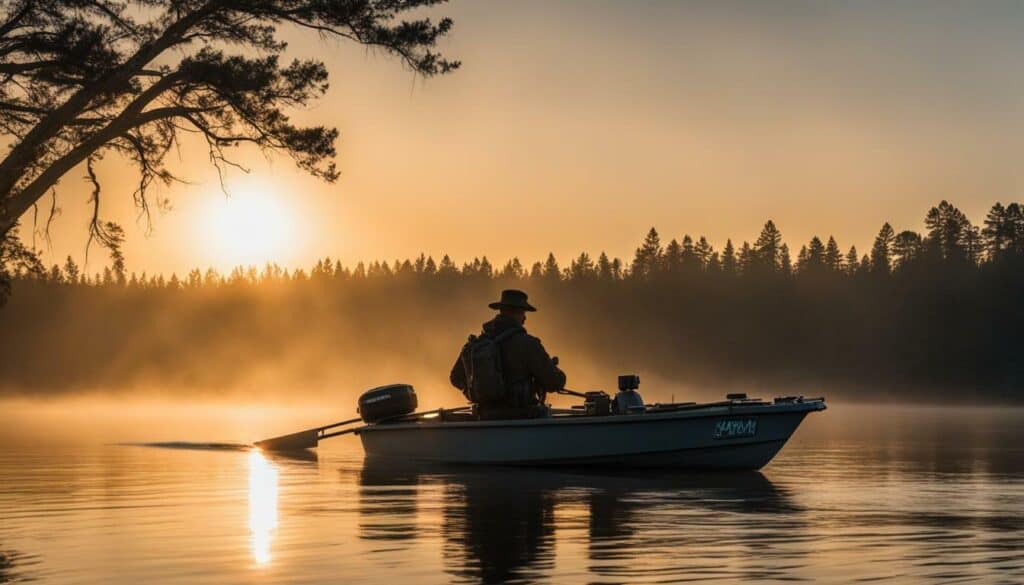
Despite the potentially dangerous working conditions and irregular hours, game wardens are driven by their passion for wildlife conservation and protecting natural resources. They play a vital role in preserving the environment and ensuring the sustainability of wildlife populations for future generations.
Administrative, Educational, and Legal Duties
In addition to their fieldwork, game wardens also have administrative, educational, and legal duties that contribute to the protection and conservation of wildlife. These responsibilities are essential for the effective management and regulation of hunting, fishing, and other outdoor activities.
One of the administrative duties of game wardens is to issue hunting and fishing licenses. They are responsible for verifying the eligibility of applicants, ensuring compliance with regulations, and maintaining accurate records of licenses issued. This task helps to maintain the sustainability of wildlife populations and generates revenue for conservation efforts.
Game wardens also play a crucial role in educating the public about wildlife conservation and safety. They conduct educational programs in schools, youth centers, and community organizations to raise awareness about the importance of preserving natural resources and following hunting and fishing regulations. By fostering a sense of responsibility and respect for the environment, they help to cultivate a conservation-minded society.
“Conservation is a state of harmony between men and land.” – Aldo Leopold
When violations of wildlife laws occur, game wardens are responsible for enforcing those regulations. This includes conducting investigations, collecting evidence, and filing reports. In some cases, they may work undercover to gather intelligence on illegal activities such as poaching or the illegal sale of wildlife. They collaborate with other law enforcement agencies to apprehend offenders and bring them to justice.
Game wardens may also be required to testify in court as expert witnesses. They present evidence, provide technical knowledge, and answer questions related to wildlife laws and regulations. Their testimony is crucial for the prosecution of cases involving hunting or fishing violations, wildlife trafficking, or other environmental crimes.
Overall, the administrative, educational, and legal duties of game wardens ensure the effective management of wildlife resources and the enforcement of conservation laws. By balancing these responsibilities with their fieldwork, game wardens play a vital role in preserving ecosystems and promoting sustainable outdoor activities.
Table: Administrative, Educational, and Legal Duties
| Duties | Description |
|---|---|
| Issuing licenses | Verifying eligibility, enforcing compliance, and maintaining accurate records of hunting and fishing licenses. |
| Conducting educational programs | Delivering presentations and educational materials to schools, youth centers, and community organizations to raise awareness about wildlife conservation and safety. |
| Enforcing wildlife regulations | Conducting investigations, collecting evidence, and filing reports to ensure compliance with hunting, fishing, and other outdoor activity regulations. |
| Testifying in court | Presenting evidence, providing expert testimony, and answering questions related to wildlife laws and regulations in court cases. |
Understanding the diverse responsibilities of game wardens is crucial for appreciating the depth of their role in wildlife conservation and law enforcement. From daily patrols and interaction with the public to administrative tasks and legal proceedings, game wardens are committed to preserving the natural heritage of our ecosystems for future generations.
Special Divisions: Criminal Investigations and Search and Rescue
Some game wardens are part of specialized units that specialize in criminal investigations and search and rescue missions, adding an extra dimension to their role in enforcing wildlife laws. These divisions within game warden departments focus on handling specific cases and working closely with other law enforcement agencies to ensure the safety of both wildlife and the public.
One such division is the Criminal Investigations Unit, which is responsible for investigating and apprehending individuals engaged in illegal activities related to wildlife, such as poaching, illegal hunting, and trafficking of protected species. These game wardens work as detectives, gathering evidence, conducting surveillance, and building cases for prosecution. They collaborate with federal agencies, such as the U.S. Fish and Wildlife Service, as well as local law enforcement agencies to ensure that those who violate wildlife laws are held accountable.
Another specialized unit is the Search and Rescue (SAR) team, which is tasked with locating and rescuing individuals who are lost, injured, or in distress in wilderness areas. Game wardens in this unit are specially trained in wilderness survival, navigation, and emergency medical care. They work closely with other search and rescue teams, including state police and volunteer organizations, to coordinate efforts and ensure a timely and effective response to emergencies.
These special divisions often require game wardens to undergo additional training and certification beyond their basic law enforcement duties. They may attend specialized courses in crime scene investigation, wildlife forensics, search and rescue techniques, and advanced tactical skills. By specializing in these areas, game wardens in these divisions are able to provide valuable expertise and support to their colleagues, as well as contribute to the overall mission of wildlife conservation and public safety.
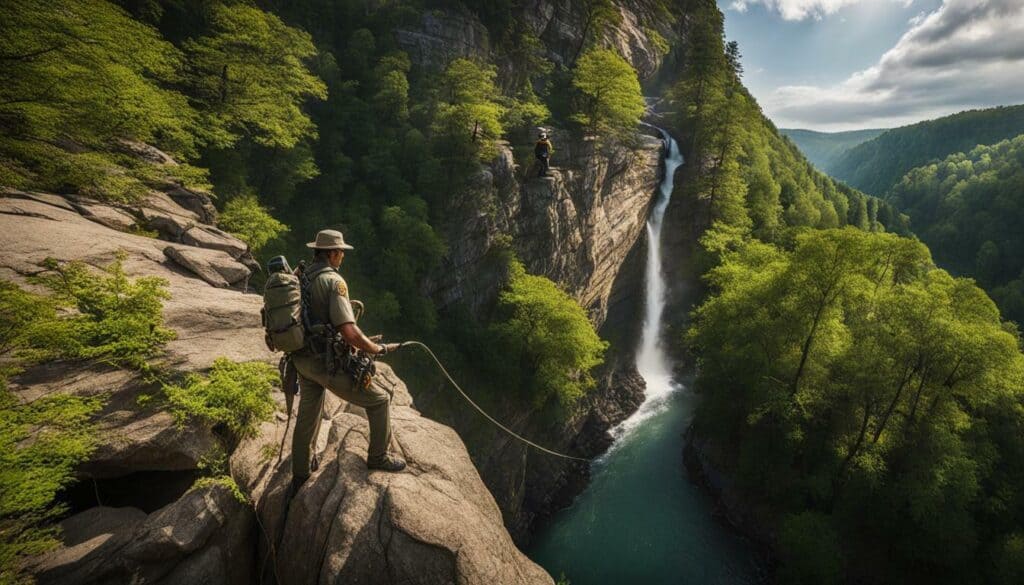
“Special divisions within game warden departments focus on criminal investigations and search and rescue missions, adding an extra dimension to their role in enforcing wildlife laws.”
These specialized units play a crucial role in protecting wildlife and ensuring the safety of both the natural environment and the public. Through their expertise and dedication, game wardens in these divisions contribute to the overall mission of conserving wildlife, enforcing the law, and preserving the delicate balance of our ecosystems.
Related Careers:
- Conservation Police Officer
- Park Ranger
- Wildlife Conservation Officer
- Environmental Law Enforcement Officer
By exploring these related careers, individuals interested in wildlife law enforcement can gain a better understanding of the various opportunities available to them. Each of these professions has its own unique focus and responsibilities, but all share a common goal of protecting and preserving our natural resources for future generations. Whether through law enforcement, education, or scientific research, these careers offer fulfilling pathways for those passionate about wildlife conservation and public service.
Primary Duties of a Fish and Game Warden
Regardless of their specific title or agency, all game wardens have the main duty of enforcing fishing, hunting, and wildlife protection laws to preserve and protect the natural environment. They are responsible for maintaining the delicate balance between human activities and wildlife conservation. Let’s take a closer look at the primary duties of these dedicated individuals.
Enforcing Laws
One of the key responsibilities of a fish and game warden is to enforce the laws and regulations related to fishing, hunting, and wildlife protection. They patrol their assigned areas, whether by foot, horseback, boat, or other means, to ensure compliance with these laws. This involves observing and documenting any violations, issuing warnings or citations, and taking the necessary legal actions when needed.
Conservation and Habitat Management
Fish and game wardens play a crucial role in preserving and protecting natural habitats and wildlife populations. They work closely with wildlife biologists, ecologists, and other professionals to collect data on wildlife and their habitats, monitor population levels, and implement conservation programs. By doing so, they contribute to the overall health and sustainability of ecosystems.
Public Education and Outreach
Educating the public about wildlife conservation, hunting and fishing regulations, and the importance of preserving natural resources is another important duty of game wardens. They conduct educational programs in schools, give presentations to community organizations, and interact with the public to raise awareness about wildlife conservation and the role they play in protecting it.
Search and Rescue Operations
Game wardens are often involved in search and rescue operations, especially in remote and wilderness areas. They receive specialized training to respond to emergencies and assist in locating missing individuals, providing medical assistance, and ensuring their safe rescue. These operations require strong physical and mental capabilities, as well as the ability to work effectively under challenging conditions.
Criminal Investigations
In addition to enforcing wildlife laws, game wardens may participate in criminal investigations related to poaching, illegal wildlife trade, and other wildlife-related offenses. They work closely with other law enforcement agencies, gather evidence, conduct surveillance, and assist in the prosecution of offenders. Their role in criminal investigations adds an extra layer of complexity to their job and highlights their commitment to ensuring justice for wildlife and preserving the integrity of ecosystems.
Collaboration with Other Agencies
Game wardens often collaborate with other agencies, such as local police departments, environmental agencies, and wildlife organizations. This collaboration allows them to exchange information, coordinate efforts, and address complex issues that require a multi-agency approach. It demonstrates the interconnectedness of various stakeholders in wildlife conservation and highlights the importance of partnerships in achieving common goals.
In conclusion, game wardens play a vital role in enforcing fishing, hunting, and wildlife protection laws, while also contributing to the conservation and preservation of natural resources. Their diverse range of duties showcases their commitment to maintaining the delicate balance between human activities and the well-being of wildlife and ecosystems. Through their efforts, game wardens make a significant impact on the preservation of our natural heritage for current and future generations.
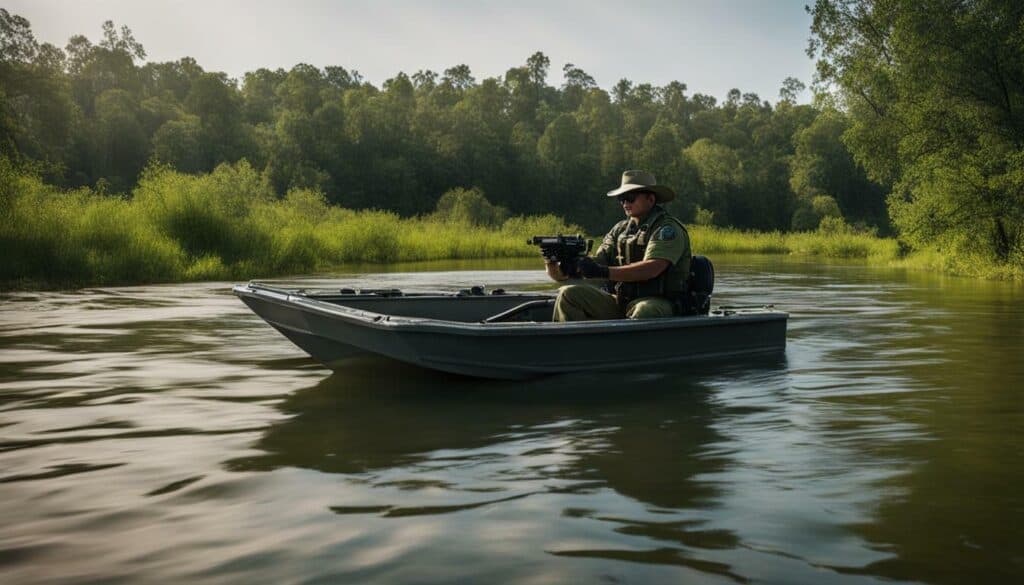
Conclusion
Game wardens play a vital role in conserving wildlife and enforcing hunting and fishing laws, making it essential to appreciate their daily tasks and responsibilities. Understanding what game wardens do on a daily basis helps us recognize the dedication and hard work they put into protecting our natural resources and preserving our wildlife.
From patrolling assigned areas to enforce game, fish, and boating laws, to managing wildlife programs and educating the public, game wardens have a wide range of duties. They work in diverse settings, from federal lands to state territories, and face various working conditions, including outdoor work and irregular hours. Their commitment to public safety and the preservation of wildlife drives them to work in dangerous situations and difficult weather conditions.
Game wardens often have atypical work hours, as their job requires them to patrol at night, on weekends, and during holidays when people are engaging in hunting and fishing activities. They may spend long hours in the field, collecting data, responding to emergencies, and ensuring compliance with wildlife regulations.
While daily patrol duties are a significant part of their job, game wardens also have administrative, educational, and legal responsibilities. They issue licenses, conduct educational programs, and testify in court to enforce wildlife laws. They collaborate with wildlife biologists and ecologists to gather data on wildlife and natural habitats and ensure the well-being of our ecosystems.
Some game wardens may be part of specialized units, focusing on criminal investigations or search and rescue missions. These units work closely with other law enforcement agencies to handle specific cases and protect public safety.
Regardless of their geographical location or agency, all game wardens share a primary duty to enforce hunting, fishing, and wildlife protection laws. They work tirelessly to preserve our native species, protect ecosystems, and make the world a better place for current and future generations.
By understanding and appreciating the daily tasks and responsibilities of game wardens, we can gain a deeper understanding of their essential role in wildlife conservation and law enforcement.
FAQ
Q: What are the primary duties of a game warden?
A: Game wardens patrol their assigned areas to enforce fishing, hunting, and wildlife protection laws. They also protect and preserve native wildlife and ecosystems, issue warnings or citations, and collect data on populations and conditions of fish and wildlife.
Q: What are the working conditions like for game wardens?
A: Game wardens primarily work outdoors and may have to work in dangerous conditions, including severe weather. They often patrol alone and interact with the public through community education programs and license issuing. They may also be required to testify in court.
Q: What are the typical work hours for game wardens?
A: Game wardens do not have typical work hours and often work nights, weekends, and holidays. They may have to patrol at night and respond to emergencies at any time. The nature of their job requires them to be flexible with their schedule.
Q: What are the specialized divisions within game warden departments?
A: Some game wardens work in specialized units focused on criminal investigations or search and rescue missions. These units may work on specific cases and collaborate with other law enforcement agencies.
Q: What is the importance of game wardens in wildlife conservation?
A: Game wardens play a crucial role in conserving wildlife and enforcing the law. They protect natural resources, ensure public safety, and educate the community about gaming laws and wildlife conservation. Their efforts help preserve native species and habitats for future generations.
Can a Garden Wash Basin Enhance the Work of Game Wardens?
A perfect garden wash basin can indeed enhance the work of game wardens. As they spend significant time outdoors, having a dedicated area to clean up can greatly improve their efficiency and effectiveness. With easy access to water and a convenient washing station, game wardens can maintain cleanliness, promote hygiene, and enhance their overall work experience.

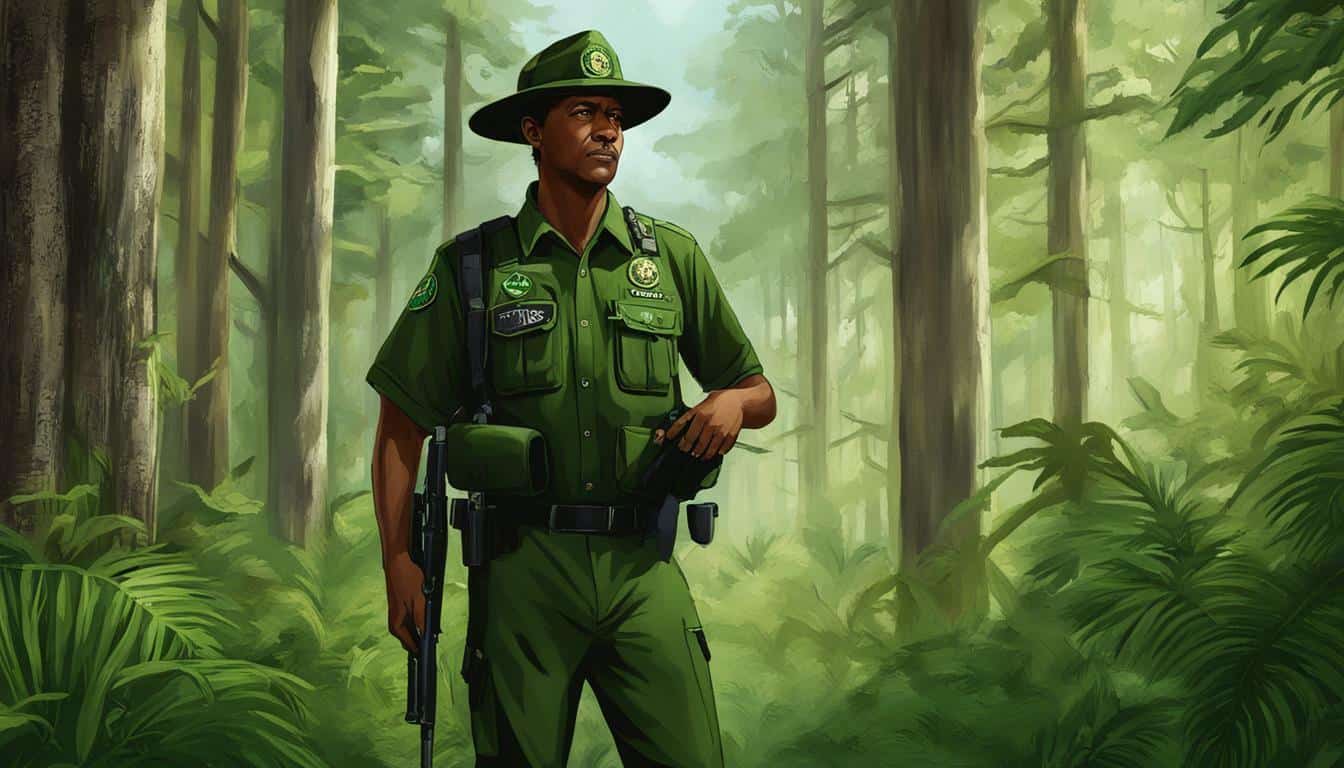



Leave a Reply